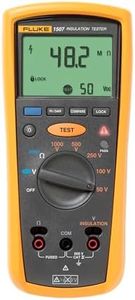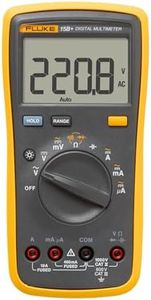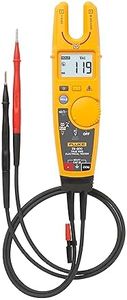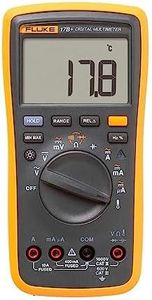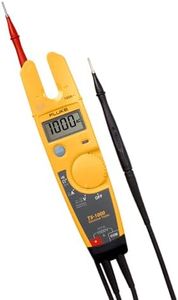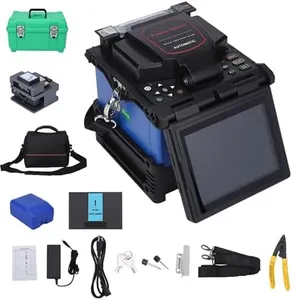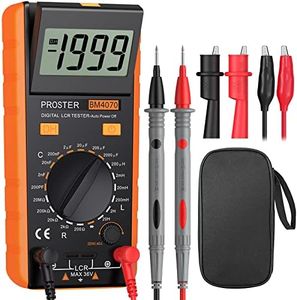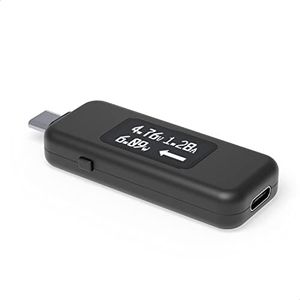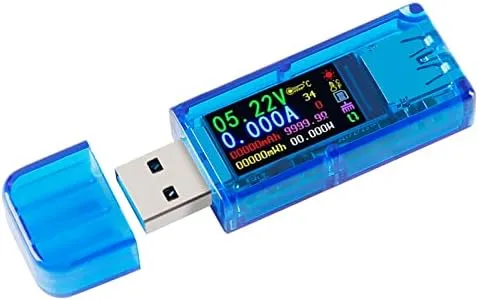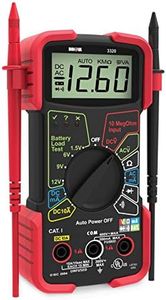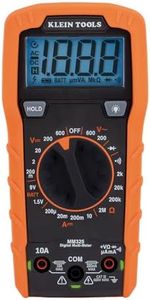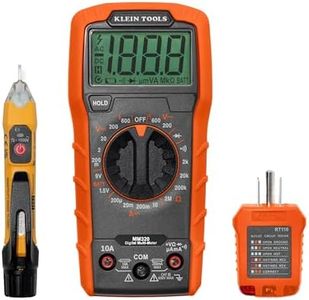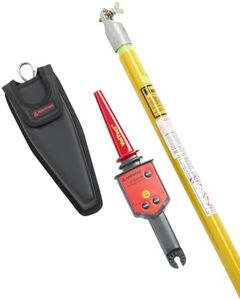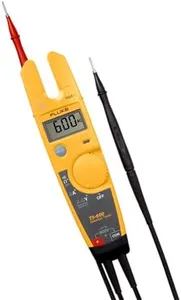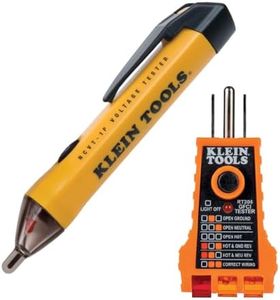10 Best Voltage Testers 2026 in the United States
Our technology thoroughly searches through the online shopping world, reviewing hundreds of sites. We then process and analyze this information, updating in real-time to bring you the latest top-rated products. This way, you always get the best and most current options available.

Our Top Picks
Winner
Fluke 1507 Digital Megohmmeter Insulation Resistance Tester, for Advanced Industrial and Electrical Insulation Testing, Offers Multiple Insulation Test Voltages: 50 V, 100 V, 250 V, 500 V, and 1000 V
Most important from
266 reviews
The Fluke 1507 Digital Megohmmeter is a solid choice for professionals needing reliable insulation resistance testing. It covers a wide voltage range, offering test voltages of 50, 100, 250, 500, and 1000 volts, which suits many industrial applications well. Its digital, battery-powered design includes a large backlit display, making it easy to read results even in dim conditions. Built with safety in mind, the tester will not perform insulation tests if it detects live voltage above 30 volts, helping protect users from accidental shocks. The included remote test probe is handy for repetitive or hard-to-reach tests, adding convenience. Calibration before shipment assures accuracy (+/-0.5%), which is essential for trustworthy measurements.
The unit meets EN 61010-1 safety standards and comes with a one-year warranty, giving some peace of mind about durability and quality. On the downside, it weighs about 2.2 pounds, which may feel a bit bulky compared to lighter handheld testers. If you need a dependable, well-built insulation tester with multiple voltage options and good safety features, the Fluke 1507 is a worthy tool to consider.
Most important from
266 reviews
Fluke 15B+ Digital Multimeter, for Electrical Applications, Measures AC/DC Voltage and Current Measurements up to 1000V and 10A, Along with Resistance, Continuity, Diode, and Capacitance Capabilities
Most important from
784 reviews
The Fluke 15B+ Digital Multimeter is a reliable tool for electrical applications, offering a broad voltage range up to 1000V for both AC and DC, which makes it versatile for various tasks from automotive diagnostics to electrical panel work. Its capability to measure up to 10A of current is useful for detecting issues like overloading and short circuits. The addition of features like resistance, continuity, diode, and capacitance measurements further enhances its utility for troubleshooting a wide range of electrical issues.
The CAT III 600V safety rating is a significant advantage, ensuring a high level of protection when working on residential and commercial electrical systems. The build quality is robust, typical of Fluke products, and the device is relatively lightweight at 460 grams, making it easy to handle and carry around. However, users should be mindful that it is battery-powered, which means keeping spare batteries handy is essential to avoid downtime. Additionally, while the multimeter is adequately featured, some might find the display and indicators a bit basic compared to more advanced models that offer backlit displays or additional data logging functions.
The Fluke 15B+ is well-suited for electricians and hobbyists needing a dependable, all-around multimeter for a variety of electrical measurements.
Most important from
784 reviews
Fluke T6-600 Electrical Tester
Most important from
1297 reviews
The Fluke T6-600 Electrical Tester is a versatile tool designed for measuring voltage, current, and frequency. Its standout feature is the ability to measure voltage up to 600V without needing test leads, thanks to its open fork design with FieldSense technology. This makes it particularly safe and convenient for users, reducing the need to handle live wires directly.
The wide 17.8-millimeter open fork can handle wires up to 200 A on 4/0 wires, making it suitable for a range of industrial applications. The device is lightweight at 0.35 kilograms and powered by two included AA batteries, making it portable and easy to use in various environments. However, the Fluke T6-600 does have some limitations. It might not be suitable for very high voltage applications beyond 600V, and some users may miss the precision that traditional test leads provide.
The build quality is robust, consistent with Fluke's reputation for durable tools, and the safety ratings are high, ensuring reliable performance. Its display and indicators are user-friendly, providing clear readings. The Fluke T6-600 is ideal for those needing a reliable, safe, and efficient electrical tester for mid-range voltage applications.
Most important from
1297 reviews
Buying Guide for the Best Voltage Testers
Choosing the right voltage tester is crucial for ensuring safety and accuracy when working with electrical systems. Voltage testers are used to detect the presence of electrical voltage in a circuit, which helps in troubleshooting and verifying electrical installations. To pick the best voltage tester for your needs, you should consider several key specifications that will determine its suitability for your specific tasks. Understanding these specifications will help you make an informed decision and ensure that you have a reliable tool for your electrical work.FAQ
Most Popular Categories Right Now
